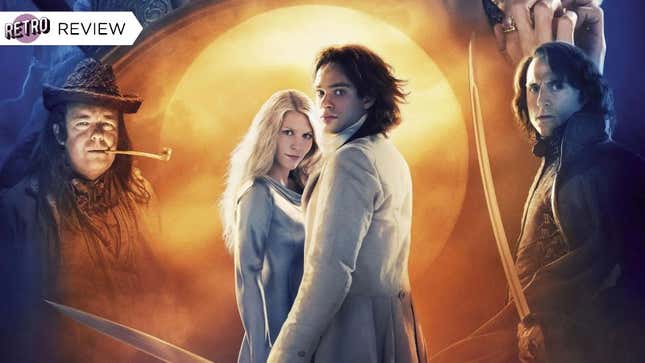
As I sat down to revisit Matthew Vaughn’s adaptation of the Neil Gaiman novel Stardust, a family friend who was visiting asked me a question. “What are you watching?” “Stardust.” “What’s that?” “This fantasy movie with Michelle Pfeiffer and Robert De Niro.” “I’ve never heard of it.” “Henry Cavill is also in it and he fights Daredevil.” “Ben Affleck?”
I found the conversation funny but also incredibly telling. That this friend didn’t know Stardust was not some anomaly. The film opened 15 years ago today and in that time certainly found its fans, but never quite captured the imaginations of the world in the way it should have. And yet, I saw it when it was released and loved it. Was I some outlier? What was the problem with Stardust?
Part of the issue is probably Rush Hour 3. The Jackie Chan-Chris Tucker action comedy sequel opened on the same day and promptly trounced Stardust at the box office. That was also the second week of the action-packed The Bourne Ultimatum, the third week for the long-awaited The Simpsons Movie, and in the following weeks, the generational comedy Superbad opened, as well as Rob Zombie’s remake of Halloween. Box office competition was fierce in August 2007, especially for films gunning for that younger audience Stardust was meant for. It fell out of the top 10 within a month. Internationally it did significantly better, but that initial gut punch at the U.S. box office did the film’s legacy no favors. Fewer eyeballs upon initial release meant less marketing dollars moving ahead and a relatively quiet arrival in the home market.

Fifteen years later though, no one is talking about Rush Hour 3 anymore. That’s because Stardust has something going for many other films don’t: it’s really freaking good. Who better than Neil Gaiman to craft a memorable, imaginative story? What better time in a director’s career than their second film, which Stardust was for Matthew Vaughn, for a filmmaker to take a big step up? And the cast, while headlined with steadfast stars of the day like Pfeiffer and De Niro, was filled with incredible talent from top to bottom: Claire Danes, Charlie Cox (the aforementioned Daredevil, of course), Mark Strong, Rupert Everett, Henry Cavill, Sienna Miller, Ricky Gervais, Ben Barnes, Peter O’Toole, Ian McKellen, truly, the list goes on and on. That several of them have become even more famous since the film’s release only adds to its success.
As a result, though Stardust was not a box office sensation; it was a critical hit upon its release and remains as solid and entertaining a film as ever. In large part that does have to do with seeing this incredible cast work their magic on this story. But it’s also the brilliance, complexities, and scope of the story itself. At its heart, Stardust is the story of a young, lovesick boy named Tristan (Cox) who decides to cross a wall that separates his world from another to retrieve a fallen star for his crush, Victoria (Miller). He finds the star but it’s actually a person named Yvaine (Danes) and as the two try to get back to Victoria, they’re pursued by the witch Lamia (Pfeiffer) who wants to eat the star—literally—and several princes (Strong and others) who need the star to become king of the realm. It sounds complicated but Vaughn and co-writer Jane Goldman (who also did Kick-Ass, X-Men: First Class, and more after Stardust) lay it out very simply. The film then unspools in a manner that keeps everything cohesive and propulsive. There are no frills and the film is better off for it.

Along the way, Gaiman’s world bustles with imagination; it’s filled with elements like the pirate Captain Shakespeare (De Niro), who flies across the skies in his ship, sells lightning bolts, and hides his charming true self. The way people travel via candlelight. That flowers offer protection from magic. Or how when each would-be-king dies they become ghosts who look as they did at death and proceed to become a Greek chorus to the film’s events. And just when the film feels like it can’t get any more adventurous or weird, the burgeoning love story between Tristan and Yvaine becomes more prominent and moving as both Cox and Danes electrify the screen with infectious joy and wonder. If it wasn’t for a third act that drags out just a bit too long, and a few un-PC moments that haven’t aged well, I’d be hard-pressed to say a single bad thing about Stardust.
So while the film didn’t immediately capture the imagination of the movie-going public 15 years ago, I was delighted to discover that Stardust is not a film beholden to time. It’s so fun, heartwarming, and well-made that it’s sure to endure and capture imaginations from now until forever. Simply put, Stardust is magic, and that it can still work its spell after all this time is a testament to its quality.
Stardust is currently streaming on HBO Max.
Want more io9 news? Check out when to expect the latest Marvel and Star Wars releases, what’s next for the DC Universe on film and TV, and everything you need to know about House of the Dragon and Lord of the Rings: The Rings of Power.